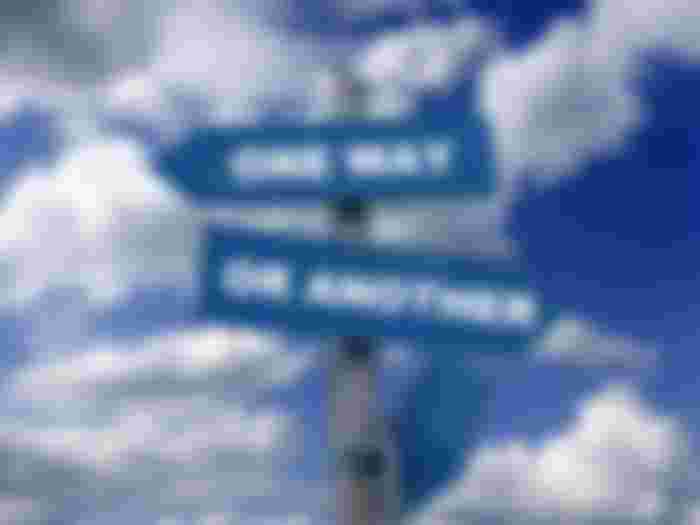Fate Versus Free Will: The Classic Philosophical Debate
Philosophical debates have been around as long as the human species has. One of the most enduring philosophical debates revolves around the issue of fate and free will. The questions of fate and free will pertain to your understanding of what role chance vs. choice has in guiding your lives.
In this philosophical discussion, the classical theory of fate is introduced by the Noble One (Plato), and the foundational theory of free will is introduced by the Sophist (Aristotle). The two sides debate the origins of morality and the human condition.
Most discussions about the nature of free will are actually about fate. In the sense of where things came from. Some people say we have a power over fate, whereas others feel the opposite is true.

The Definition Of Fate
Fate is a term that's tossed around quite a bit, but its meaning (or at least the meaning that's being discussed) varies from person to person. Fate is typically described as destiny. You have a destiny, whether you're aware of it or not. The stars above you dictate your path and you have little to no control over it.
Destiny is a tempting concept for most people. It's something that we long for, but that we're often unwilling to accept. We often prefer to believe we're in control, but in truth we're not. However, that's a discussion for another time.
The Definition Of Free Will
Free will is another term that's often debated, but its meaning seems to vary based on who's using the term and what they're trying to accomplish. Many people use the term "free will" to refer to the power that human beings have, to choose or not choose based on conscious and/or subconscious motivations.
Free will can also be used to refer to the ability to affect our future, without relying on predetermined causes or effects. The "free will" that people are trying to refer to is the power to make a choice that's not determined by outside forces, whether that be biological, psychological, spiritual, or some combination of the four.
The Classical Theory Of Fate
The classical theory of fate as Plato puts it, is the idea that everything that happens, happens for a reason. This includes not just what happens to you in your lifetime, but also what happens in all the pasts of all the people who ever lived.
The idea of fate can be a difficult one to grasp, but the idea of a reason is much more approachable. Though reasons can be strange, and reasons are often contradictory. In other words, if one event happens for a reason, it doesn't necessarily mean another event doesn't happen for a reason; it just means the former reason trumps the later reason.
In a similar manner, one reason can be used to justify a large number of different actions. For example, one could say that every action has a reason and the reasons just cancel out. This is called the "moral opposite" of a given reason.
For example, if one says that a certain behavior is moral, one could say that it's the moral opposite of that behavior. Plato, in the ancient Greek, presents the idea of fate as a way to think about the world. Fate isn't something that one chooses; it's a given.
One doesn't have a choice about the fact that one was born, for example. The idea is that one's actions should be directed towards a goal that one has chosen oneself. To say that one has "free will" is to say that one can choose to do what one wills.
The "Nature" Of Choice

It's important to remember that "choice" is a very powerful word. To choose to do something, one must first believe that the choice is real, and second, one must have the power to perform the action. To say that choice is meaningless is to say that one cannot choose to do something that one believes is impossible.
To say that choice is a poor word for describing what happens when one is born is to recognize the fact, that one cannot choose what one was born as. However, one can choose what one becomes. This is the most powerful idea in all of philosophy.
The "nature" of choice, if you will. It makes sense then, to look at the elements of choice, and see what's important for making a choice.
The "Will" Of Choice
Perhaps the most commonly known aspect of choice is the will, or more specifically, the absence of the will. This is the part of you that thinks, "I don't want to go to the party. It's stupid." Your conscious mind is telling you one thing, while your subconscious mind is telling you another.
Or perhaps there is no difference, only that one is a lot louder than the other. Choices are influenced by the will. If you think you shouldn't choose X, then you won't. If you're convinced, that X is the right choice, then there's nothing to stop you.
The "Emotions" Of Choice
The emotional part of the process is a little more clouded and perhaps much more interesting. When you make a choice, you're doing so while simultaneously feeling one way or another. Depending on how the choice is made, the way one is feeling can either be reinforced, or it can be contradicted.
For example, if you choose to go to the party, because you believe that you should, the feeling that you should be having is reinforced. The opposite happens if you go, because you're tired of being alone.
You can also feel regret, or perhaps more accurately, the lack of it. If you're feeling regret, then you didn't choose the way you did, because you didn't think it through. It doesn't mean you had no choice, it just means you didn't weigh the consequences as well as you could have.
The way you feel, however, is not as important as the reason for your feeling. If you go to the party anyway, even if you're only doing it out of a sense of obligation, you still chose to go. You still have to deal with the consequences of that choice.
The "Reality" Of Choice
As I said, choices are not easy. One thing that you probably realized is that you're not sure that you actually have a choice in this situation. You may not have a choice in the actual act of being born, but you still have a choice in the way you are raised and the way you behave.
For example, someone could try to convince you that certain moral choices, such as the one concerning your own existence, are in fact not real choices at all, but rather "fate". This would be a very radical position, to be sure; it would probably involve a great deal of thought, and perhaps even a certain measure of craziness.
One thing that you do know for certain, however, is that one can try to convince others that a certain way of behaving is correct, and that other ways are not only incorrect, but actively harmful. If someone says that certain choices are not valid choices, then they're not. Period. The trick, of course, is in how that certain someone tries to prove their point.
The "Truth" Of Choice
As with the other aspects of the philosophy of religion, the philosophy of mind has proposed several different theories regarding the nature of "truth" and "falsity". One such view, called "representationalism" proposes, that reality itself is made up of information and that what we experience is simply the way we encode and interpret this information.
In other words, everything that exists has an "essence" or a "core", and it is the job of the mind to decide how to interpret this information. If this is the case, then there can be no such thing as a fact outside of the mind. There are only representations, or ways in which the world is "coded".
The fact of whether there is an afterlife, for example, might be a matter of the mind deciding that there is such a thing, and codifying that as "true". You may not believe, that there is an afterlife, but if someone else believes it, then that is a representation of the world, and you must respect their interpretation of it.
These four elements of choices above show, that the will, is the desire to choose a certain way and the emotions that go with that. The emotions are a reaction to the consequence of the choice and the reasons for one's choice. The reality, is simply the state of things and the way they are. The truth, is what one decides to believe. These aspects of choices are not the only aspects of choices, but they are the most powerful and the most relevant to human life.
Thank you for reading.




The philosophical debate you raise is even deeper when it became part of epistemology. Modern science itself can depart from the same premises to articulate its findings. That is: determinism or indeterminism.
For example, if we start from physical determinism, classical authors such as Pier Simon de Laplace or Isaac Newton would tell us that we are predetermined. If physically we are composed of particles in motion, if emotions are chemical reactions, etc. it is only necessary to know the laws that govern that substances. If we knew the position and direction of all the particles that make us up we could know what will inevitably happen next. And in the same way we can know what their previous position was. That is to say: past and future are written, although we do not know the laws that govern it.
Einstein's relativity, Lorenz's Chaos, Turing's Undecidability or Heissenberg's Uncertainty point to the fact that such determinism may not exist. Nowadays science is more inclined towards chaos and complexity than towards determinism (mathematical determinism, by the way). Everything happens according to unknown and even random variables.
But the problem is that in both cases there is no place for human free will. If everything is 'written', no matter what we do, we cannot choose what is going to happen. But if everything we do has random and unpredictable consequences, we cannot choose or intervene in what we want to happen either. In both cases we can't do anything to choose our 'fate'.
Perhaps everything happens in what Monod, and more recently Illya Prigogine called 'randomness and obligation' (chance and necessity). Not everything is determined but at the same time not everything is random and lacking some 'law'.
Perhaps between those 'chance and necessity', the life happens without reaching none of them.
Great and inspiring post!